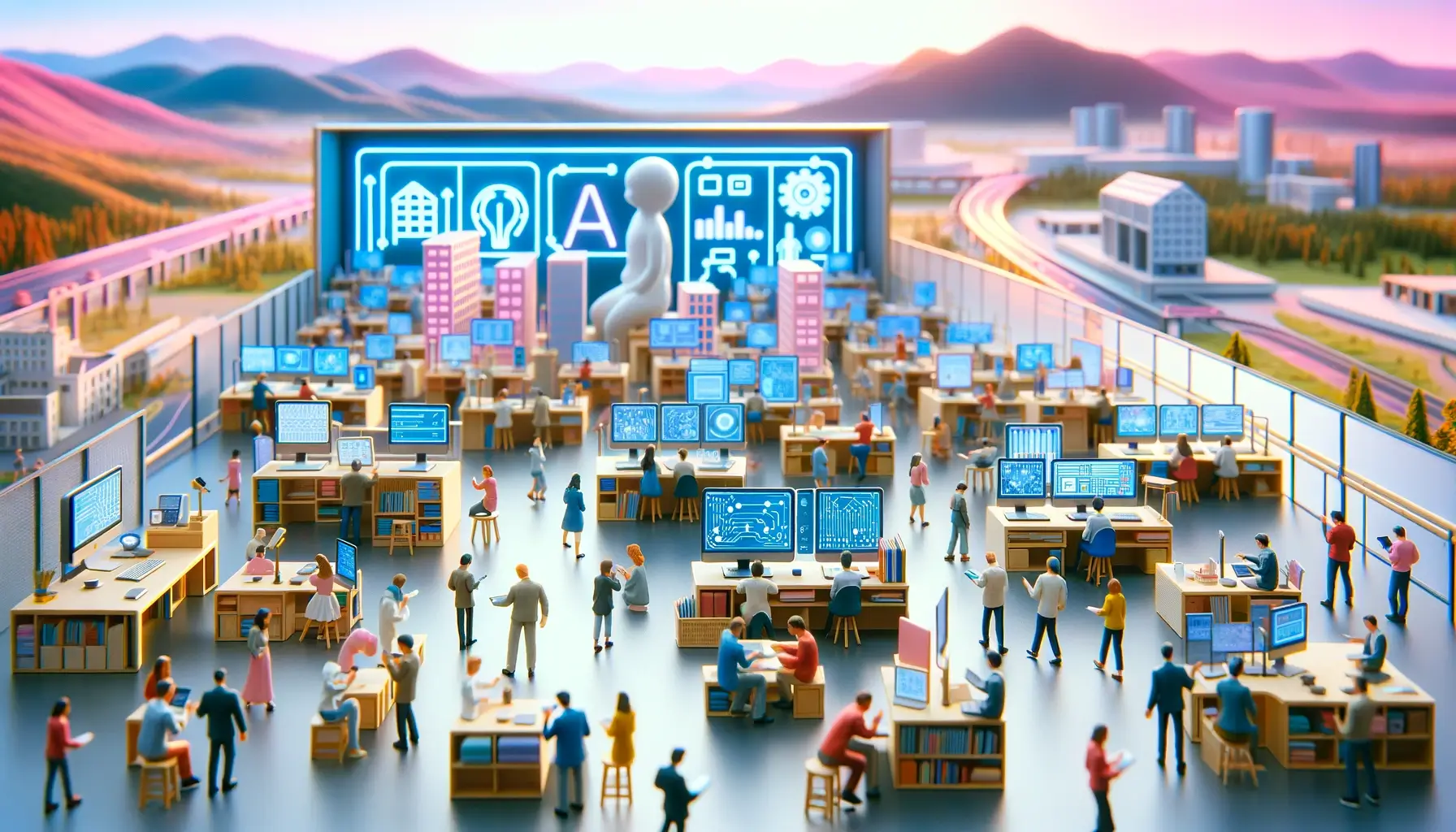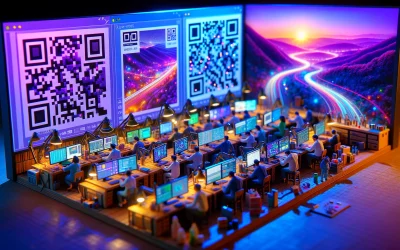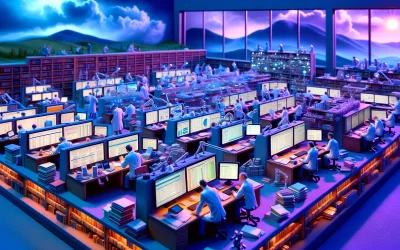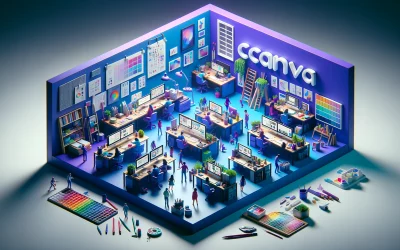Content creation is a vital aspect of modern-day marketing and advertising. With the advent of Artificial Intelligence (AI), content creation has become more streamlined, efficient, and effective. AI-powered software can help content creators reduce their workload and produce high-quality content in a shorter amount of time.
There are various AI software available in the market that can help content creators in different aspects of content creation. From generating ideas to optimizing content for search engines, AI software can help content creators in every step of the process. In this article, we will discuss some of the essential AI software for content creators that can help them create better content, save time, and increase their productivity.
AI software can help content creators in various ways, such as generating new ideas, optimizing content for search engines, proofreading, and editing. With the right AI software, content creators can create high-quality content in a shorter amount of time and with less effort. The following sections will provide an overview of some of the essential AI software for content creators and how they can help them in their content creation process.
Overview of AI in Content Creation
Artificial Intelligence (AI) is revolutionizing the way content is created. AI-powered tools are helping content creators automate time-consuming tasks, streamline workflows, and produce high-quality content at scale.
AI in content creation involves the use of machine learning algorithms to analyze data, generate content, and optimize content delivery. AI-powered tools can assist content creators in various tasks such as writing, editing, designing, and even video production.
One of the main benefits of using AI in content creation is that it can help content creators generate unique and engaging content ideas. AI-powered tools can analyze data from various sources such as social media, search engines, and online forums to identify trending topics and keywords. This data can then be used to create content that is relevant and resonates with the target audience.
Another advantage of using AI in content creation is that it can help content creators optimize their content for search engines. AI-powered tools can analyze the content and suggest changes to improve its readability, structure, and keyword density. This can help content creators rank higher in search engine results pages and attract more organic traffic to their website.
AI in content creation is not without its challenges. One of the main challenges is ensuring that the content generated by AI-powered tools is of high quality and meets the expectations of the target audience. Content creators need to ensure that the content generated by AI tools is accurate, relevant, and engaging.
Text Generation Software
As a content creator, generating high-quality text content is crucial. Fortunately, text generation software powered by AI can help. Here are some of the best options:
AI Writing Assistants
AI writing assistants, such as ChatGPT and Jasper, use natural language processing (NLP) to analyze text and generate new content. They can help content creators generate ideas, write outlines, and even produce entire articles. These tools can be particularly useful for those who struggle with writer’s block or need to produce a large amount of content in a short amount of time.
SEO Optimization Tools
SEO optimization tools like Writesonic use AI to generate content that is optimized for search engines. These tools can analyze keywords, generate meta descriptions, and even suggest titles for articles. By using these tools, content creators can improve their search engine rankings and attract more readers to their content.
Language Translation Applications
Language translation applications, such as Google Translate and DeepL, use AI to translate text from one language to another. These tools can be particularly useful for content creators who need to produce content in multiple languages. They can also help content creators reach new audiences by translating their content into languages that they may not be fluent in.
Image and Video Editing Tools
AI-Powered Graphic Design Platforms
AI-powered graphic design platforms offer content creators a range of features that can help them create stunning visuals. These platforms use machine learning algorithms to analyze images and suggest improvements, making it easier for content creators to produce high-quality graphics. Some popular AI-powered graphic design platforms include Canva, Adobe Creative Cloud, and Figma.
Canva is a user-friendly platform that offers a range of templates, graphics, and fonts. It also has an AI-powered image analysis tool that suggests improvements to images based on factors like brightness, contrast, and saturation. Adobe Creative Cloud is a more advanced platform that offers a range of tools for graphic design, photo editing, and video editing. It also has an AI-powered feature called Adobe Sensei that can help users automate repetitive tasks and make suggestions for improving their designs. Figma is a cloud-based platform that allows teams to collaborate on design projects in real-time. It also has an AI-powered feature called Smart Selection that can help users select and manipulate multiple elements at once.
Automated Video Editing Suites
Automated video editing suites use AI algorithms to analyze footage and suggest edits, making it easier for content creators to produce high-quality videos. Some popular automated video editing suites include Magisto, Animoto, and Adobe Premiere Pro.
Magisto is a user-friendly platform that allows users to upload footage and choose a theme, and then automatically generates a polished video with music, transitions, and effects. Animoto is another user-friendly platform that allows users to upload footage and choose a template, and then automatically generates a video with music and text overlays. Adobe Premiere Pro is a more advanced platform that offers a range of tools for video editing, color correction, and audio mixing. It also has an AI-powered feature called Adobe Sensei that can help users automate repetitive tasks and make suggestions for improving their videos.
Audio Processing and Music Creation
Content creators can now create and edit audio with the help of AI software. AI tools for audio processing and music creation are becoming increasingly popular among content creators. These tools can help content creators to generate high-quality audio content in a short amount of time.
AI Music Composition Tools
AI music composition tools can help content creators to create music without any prior knowledge of music theory. These tools use algorithms to analyze existing music and generate new music based on the analyzed data. Some popular AI music composition tools include:
- Project Music GenAI Control: This tool allows creators to generate music from text prompts and then have fine-grained control to edit that audio for their precise needs. Creators can use this tool to generate music for their projects quickly and easily.
- WavTool: This text-to-music AI tool offers users an AI assistant to assist with generating new sounds, midi composition, and help controlling effects.
Voice Synthesis and Editing Software
Voice synthesis and editing software can help content creators to generate realistic-sounding voices for their projects. This software can also be used to edit existing audio files and add special effects. Some popular voice synthesis and editing software include:
- AudioNotes AI: This software uses AI to transcribe audio files accurately and quickly. Creators can use this tool to transcribe their audio files and edit them with ease.
- DrumLoop AI: This extraordinary tool is a game-changer for music producers and drummers in search of rhythmic inspiration. It generates drum loops using AI, which can be customized to fit the needs of the project.
Content Optimization and Analytics
Content optimization and analytics are crucial for content creators who want to ensure their content is performing well and resonating with their audience. AI software can help content creators in this regard by providing predictive content performance tools and audience engagement analyzers.
Predictive Content Performance Tools
Predictive content performance tools use AI algorithms to analyze data and predict how well a piece of content will perform before it is even published. These tools can help content creators optimize their content for maximum engagement and reach. Some popular predictive content performance tools in 2024 include MarketMuse and SurferSEO.
MarketMuse uses AI to analyze content and provide insights on how to optimize it for search engines. SurferSEO, on the other hand, provides a 3-step workflow that guides content creators through planning, writing, and optimizing content. Both tools are designed to help content creators improve their content performance and reach.
Audience Engagement Analyzers
Audience engagement analyzers use AI to analyze audience behavior and provide insights on how to improve engagement. These tools can help content creators understand their audience better and create content that resonates with them. Some popular audience engagement analyzers in 2024 include BuzzSumo and Cortex.
BuzzSumo uses AI to analyze content and provide insights on what type of content performs best for a given topic or audience. Cortex, on the other hand, uses AI to analyze social media data and provide insights on audience behavior. Both tools are designed to help content creators create content that resonates with their audience and drives engagement.
Personalization and Recommendation Engines
Artificial Intelligence (AI) has revolutionized the way content creators approach content creation. Personalization and recommendation engines are two AI-powered tools that can help content creators deliver highly targeted content to their audience.
Through machine learning algorithms, recommendation engines can analyze user data and provide personalized content suggestions. These intelligent systems can process vast amounts of data, identifying patterns, preferences, and correlations that help deliver a more personalized experience to the user. Personalize Content: AI-Based Recommendation Strategies
AI-powered personalization can provide automated insights and offer personalized content recommendations. It can automatically select the best content for each visitor based on their behavior and preferences. This can lead to higher engagement, conversion rates, and customer satisfaction. What You Need to Know About AI-Powered Recommendation Engine Platforms
To deliver personalized experiences, content creators need to constantly gather data from users and analyze it. AI personalization engines are based on machine learning principles as well. The content personalization engine defines whether the app recommends content correctly. To do so, one needs to achieve a high level of accuracy in the recommendation algorithms. Personalized Content Recommendations with the Use of AI
Content Management and Automation
Content creation is a time-consuming process that requires careful planning and execution. To help content creators streamline their workflow, AI-powered content management and automation tools have emerged on the market. These tools can help with everything from generating ideas to scheduling posts, and can save content creators valuable time and effort.
AI Content Scheduling Tools
AI-powered content scheduling tools can help content creators plan and organize their content ahead of time. These tools use machine learning algorithms to analyze audience engagement data and suggest the best times to post content. They can also help content creators create and manage content calendars, ensuring that they stay on track with their content creation goals.
One example of an AI content scheduling tool is Loomly. Loomly uses machine learning algorithms to analyze audience engagement data and suggest the best times to post content. It also offers a content calendar feature that allows content creators to plan and organize their content ahead of time.
Automated Publishing Systems
Automated publishing systems can help content creators automate the process of publishing content across multiple channels. These systems can automatically publish content to social media platforms, blogs, and other websites, saving content creators time and effort.
One example of an automated publishing system is Hootsuite. Hootsuite offers a social media publishing feature that allows content creators to schedule posts across multiple social media platforms. It also offers a content library feature that allows content creators to store and organize their content in one place.
Educational and Training Tools
Artificial Intelligence has revolutionized the way content creators learn and train themselves. Here are some AI-powered educational and training tools that can help content creators enhance their skills.
Interactive Learning Platforms
Interactive Learning Platforms, such as Coursera and Udemy, use AI algorithms to personalize the learning experience of the users. These platforms offer a wide range of courses in various fields, including writing, digital marketing, and graphic design. The AI algorithms analyze the learning patterns of the user and provide personalized recommendations for courses and learning materials. Moreover, these platforms offer interactive quizzes, assignments, and projects, which help the users to apply their knowledge in real-world scenarios.
AI Tutors and Personalized Learning
AI Tutors, such as Cognii and Knewton, use Natural Language Processing (NLP) and Machine Learning (ML) algorithms to provide personalized learning experiences to the users. These tutors can evaluate the user’s performance and provide feedback in real-time. Moreover, these tutors can adapt to the user’s learning style and pace, making the learning experience more efficient and effective.
Ethical Considerations and Fair Use
Content creators using AI software must consider ethical considerations and fair use when generating content. AI-generated content can be harmful to the audience if it promotes violence, misinformation, or discriminatory content. Therefore, it is essential to prioritize the ethical deployment of AI in the media industry, ensuring that human jobs are not replaced but enhanced by AI technologies.
To ensure ethical considerations, content creators must incorporate AI systems that are fair, transparent, and respectful of user rights. They should establish frameworks that uphold the rights of creators, provide fair compensation, and ensure transparency in the attribution of AI-generated content. It is also crucial to navigate the ethical implications of AI-generated content, including copyright, ownership, and authenticity.
Fair use is another critical consideration for content creators. They must ensure that they are not infringing on any copyright laws when using AI-generated content. They should also consider the impact of their content on the original creator’s reputation and brand. It is essential to use AI-generated content responsibly and not use it in a way that harms others’ rights or reputation.
Future Trends in AI for Content Creation
AI for content creation is advancing at a rapid pace and is expected to transform the industry in the coming years. Here are some of the future trends in AI for content creation:
- AI-powered video creation: AI-powered video creation tools are already available and are becoming more sophisticated. These tools can help content creators produce high-quality videos quickly and easily. They can also automatically generate captions and subtitles, making videos more accessible to a wider audience.
- AI-powered chatbots: Chatbots powered by AI are becoming increasingly popular and are being used by businesses to provide customer support and answer frequently asked questions. In the future, chatbots are expected to become even more advanced, with the ability to understand natural language and provide more personalized responses.
- AI-powered content optimization: AI-powered tools can analyze data and provide insights that can help content creators optimize their content for better engagement and higher search engine rankings. These tools can analyze user behavior, identify trends, and provide recommendations for improving content.
- AI-powered content curation: AI-powered content curation tools can help content creators find relevant content to share with their audience. These tools can analyze social media feeds, news sites, and other sources to identify content that is likely to be of interest to the target audience.




